I may earn a small commission from purchases made through product links on this website at no extra cost to you. As an Amazon Associate I earn from qualifying purchases.
Last updated: March 22, 2024
Discover the unique bitter melon, a fruit that may taste very bitter but packs a punch when it comes to nutrition.
Bitter melon, also known as karela and bitter gourd, is a plant that produces a unique fruit. Unique both in taste as well as in appearance, but the nutritional benefits of bitter melon also stand out.
Even though bitter melon has a strong nutritional profile, it is still a somewhat underappreciated fruit, most likely because many people are ignoring this fruit because of its bitter taste.
In this article, I am going to explain what bitter melon is, where it originates from, what its nutritional benefits are, and how we can best eat it.
What Is Bitter Melon?
Like so many others, I was never a fan of bitter melon, either.
But over the years, I’ve been getting used to its unique taste, and I now try to eat it regularly in various recipes.
Origins
Momordica charantia in Latin, bitter melon is a (sub)tropical plant (a vine) originating from India.
The plant is now widely grown in parts of Asia, Africa, and the Caribbean, primarily for its nutritious and bitter-tasting fruit.
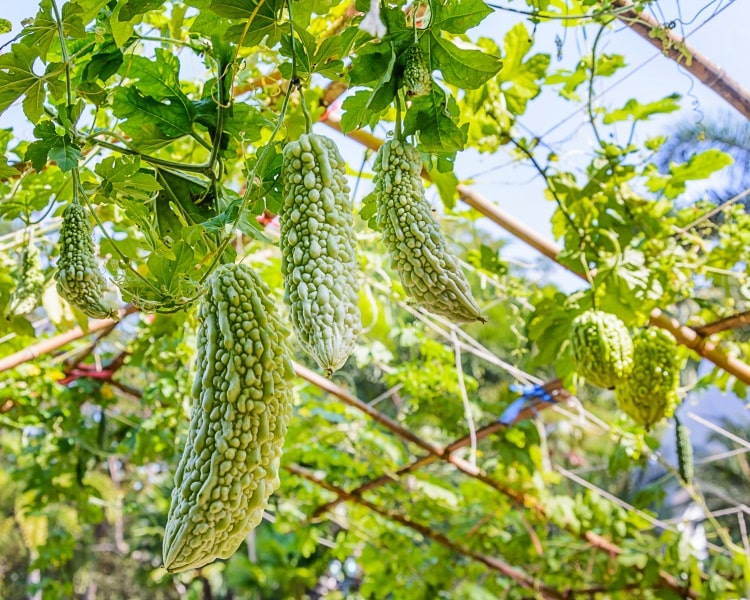
The fruit, however, is not something you would typically like to eat raw, because the bitter taste really is very dominant.
The plant can grow up to 5 meters in length and typically blooms during the summer months and fruits during fall. The bitter melon fruit is usually eaten in its early stages, when it is green or still a bit yellow.
The flesh is watery, similar to cucumber and kiwano fruit and, as mentioned, has a bitter taste. As the fruit ripens, it turns orange, with the flesh becoming even more bitter.
Different Varieties
Depending on where it’s grown, the bitter melon fruit comes in different varieties.
The Chinese variety, for example, is larger, wider, and smoother than the Indian variety. The Indian variety is pointier and has rougher skin.
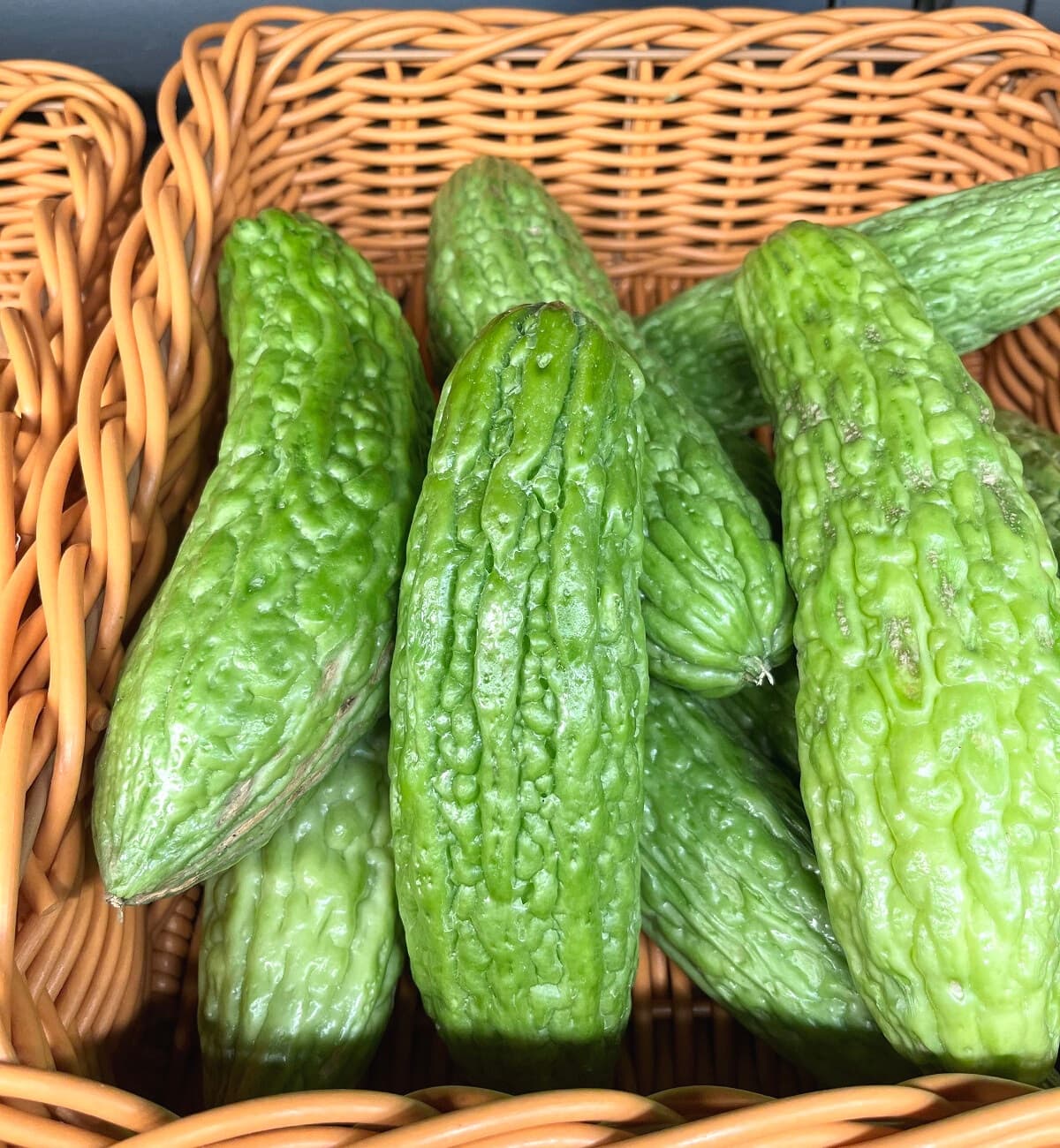
In Asian culture, bitter melon has been a popular fruit for centuries. The fruit excels as a versatile ingredient in many curries and stir fry recipes, but also in soups and herbal teas.
The other reason why bitter melon has always been so popular is that it’s been widely used in traditional medicine. It is believed by many that bitter melon can be used to combat diabetes, treat skin diseases and promote healthy digestion.
Karela, Bitter Gourd, Gōyā or Balsam Pear?
What’s in a name? Bitter melon goes by so many names that it does get a bit confusing.
The most common names used for this fruit are bitter melon, karela, bitter gourd, or balsam pear. But it’s also referred to as gōyā, African cucumber, ampalaya, or simply bitter cucumber.
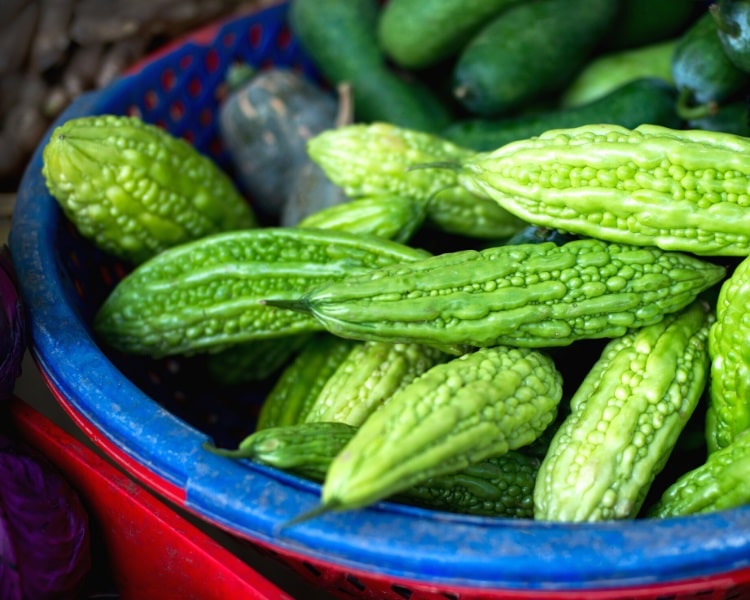
Gōyā is the Japanese name for bitter melon, often used as a tasty ingredient in Japanese dishes. Karela is the name that’s most used in India.
As a tea, bitter melon is often referred to as Gohyah tea.
Read my guide to the different types of melons that exist and learn more about other popular melons from around the world.
Nutritional Profile and Benefits
Bitter melon has a rich nutritional profile, offering various nutrients, vitamins, and minerals. Below is a summary of the most essential nutrients in bitter melon.
It is particularly rich in dietary fiber, magnesium, potassium, zinc, B vitamins (especially folate), and vitamins A, C, and K.
Also worth mentioning is that bitter melon is very low in sodium, sugar, and cholesterol.
| Bitter Melon Nutritional Profile (cooked without salt – 100 g) | |
|---|---|
| Water | 93.95 g |
| Energy | 19 kcal |
| Protein | 0.84 g |
| Fat | 0.18 g |
| Carbohydrates | 4.32 g |
| >> Dietary fiber | 2 g |
| >> Sugars | 1.95 g |
| Minerals | |
| Calcium | 9 mg (1% DV) |
| Iron | 0.38 mg (3% DV) |
| Magnesium | 16 mg (5% DV) |
| Manganese | 0.086 mg (4% DV) |
| Phosphorus | 36 mg (5% DV) |
| Potassium | 319 mg (7% DV) |
| Sodium | 6 mg (0% DV) |
| Zinc | 0.77 mg (8% DV) |
| Vitamins | |
| Vitamin A (RAE) | 6 μg (1% DV) |
| Vitamin B1 (Thiamine) | 0.051 mg (4% DV) |
| Vitamin B2 (Riboflavin) | 0.053 mg (4% DV) |
| Vitamin B3 (Niacin) | 0.28 mg (2% DV) |
| Vitamin B6 | 0.041 mg (3% DV) |
| Vitamin B9 (Folate) | 51 µg (13%) |
| Vitamin C | 33 mg (40%) |
| Vitamin E | 0.14 mg (1%) |
| Vitamin K | 4.8 µg (5%) |
| Sources: USDA, Wikipedia | |
Benefits
What are some of the claimed benefits of consuming bitter melon?
1. Blood Sugar Levels
The biggest claimed health benefit of bitter melon is that it helps to control diabetes. The bitter melon fruit contains compounds that supposedly have an hypoglycemic effect, which means that it helps to control blood sugar levels.
These compounds assist in the transportation of glucose from the blood into the cells and are therefore beneficial for type 2 diabetes patients.
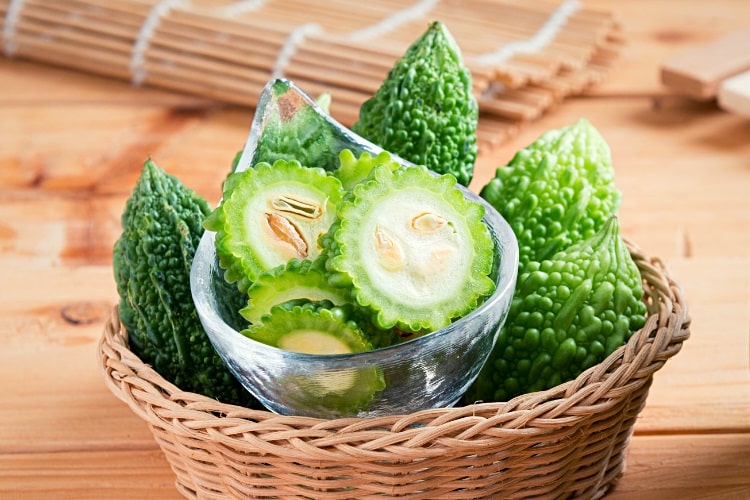
However, before rushing into a bitter melon diet, it is strongly recommended to consult a medical practitioner.
It is important to have a good understanding of how much you can have and also what the potential side effects are of consuming (too much) bitter melon.
2. Rich in Vitamins and Minerals
100 Grams of bitter melon contains nearly half your recommended daily intake of vitamin C, a powerful antioxidant that strengthens your immune system.
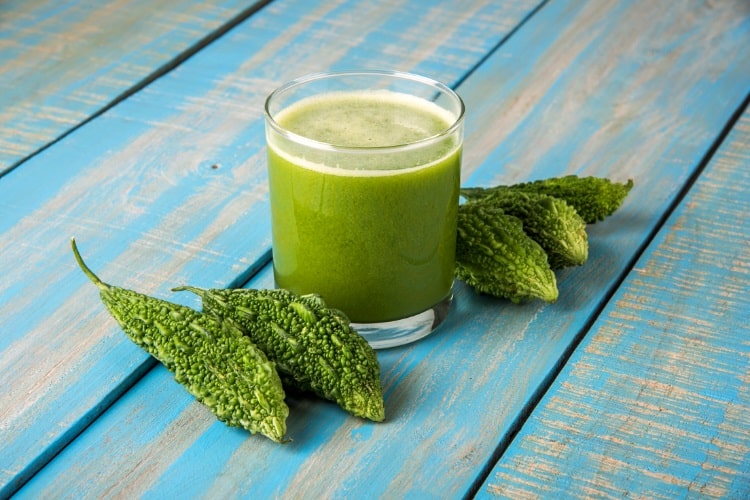
Vitamin B6 is an essential vitamin that helps with many functions in our body, such as making antibodies, maintaining a normal nerve function and breaking down proteins.
Bitter melon is also rich in potassium, zinc, and folate, to name a few.
3. Improved Digestion
Bitter melon is an excellent source of dietary fiber, which helps to improve digestion. Even if you don’t have any form of constipation, you still need sufficient fiber.

Dietary fiber works as a natural laxative so that consumed food moves nicely through your intestines, thus preventing constipation and promoting healthy gut bacteria.
Bitter Melon Tea and Supplements
If the taste of bitter melon puts you off so much that you can’t eat it, then maybe you could try bitter melon tea.
Bitter melon tea, often sold as gohyah tea, is a herbal tea made with infused dried bitter melon slices. The tea version still has a bitter taste, but it’s not as intimidating or overwhelming as the taste of fresh bitter melon.
The tea is often promoted as a traditional medicinal tea offering the same health benefits as fresh bitter melon.
To make it even easier, you can also enjoy the benefits of this fruit by taking bitter melon supplements, such as this popular Nutricost product:
- 2,400mg equivalent (From 600mg of 4:1 Extract) of Bitter Melon (Momordica...
- 180 Capsules of Bitter Melon Per Bottle
- High Quality Bitter Melon In Every Serving
Recipes with Bitter Melon
Eating bitter melon by itself is going to be a challenge because it’s so bitter. But the complex flavors of this fruit have established bitter melon as a tasty and versatile ingredient in Asian cuisine for centuries.
The bitterness of the fruit actually works really well when balanced with spicy or otherwise sweet flavors. If you’d like to learn more, read my article that explains how to prepare and eat bitter melon in much more detail.
Check out these two recipes with bitter melon:
1. Stir-Fried Bitter Melon with Ground Pork
A refreshing Asian-style dish, with ground pork, fermented black beans, and fish sauce. Stir-frying is probably the best way for people to “accept” bitter melon and its bitter flavor.
This recipe mixes bitter melon with ground pork, served in fish sauce with garlic, black beans, and red chilies. Yum!
You can find this delicious stir fry bitter melon recipe here.
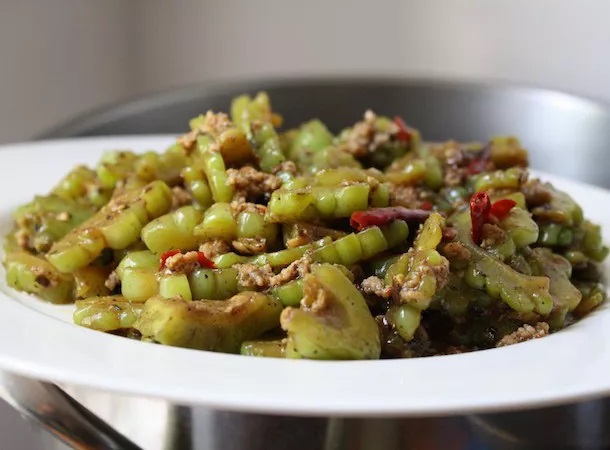
2. Bitter Melon Smoothie
Bitter melon is certainly not the first ingredient you’d think of when preparing your next juice or green smoothie, but as long as you counter it with sweeter ingredients, you can’t go wrong.
This particular bitter melon smoothie recipe that I’ve found and tried hides the flavors of bitter melon quite well, as it’s packed with delicious ingredients, such as bananas, pineapple, berries, and spinach.
You can find this delicious bitter melon smoothie recipe here.
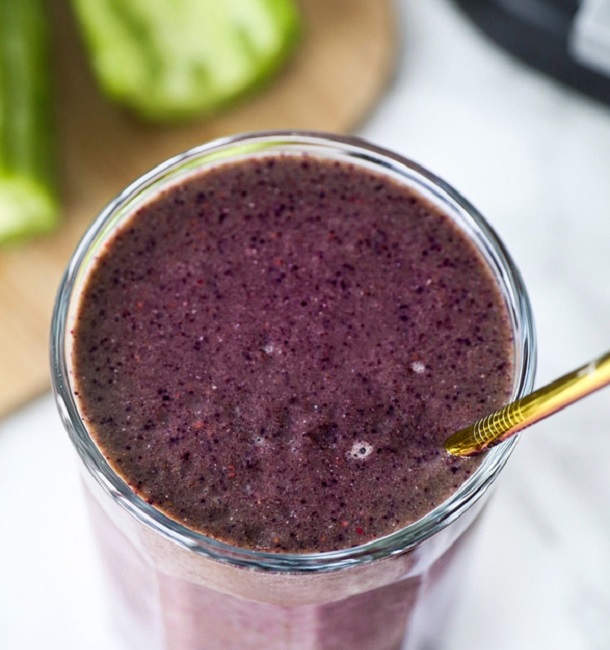
Final Thoughts
If you’ve never eaten bitter melon before or don’t eat it as often, then I hope this post has encouraged you to add this versatile and nutritious fruit to your diet.
Besides its strong nutritional profile, bitter melon also lends itself well as an ingredient in recipes because of its unique taste. Try the above stir fry and smoothie recipes, experiment with the ingredients, and you may become a bitter melon fan like me.
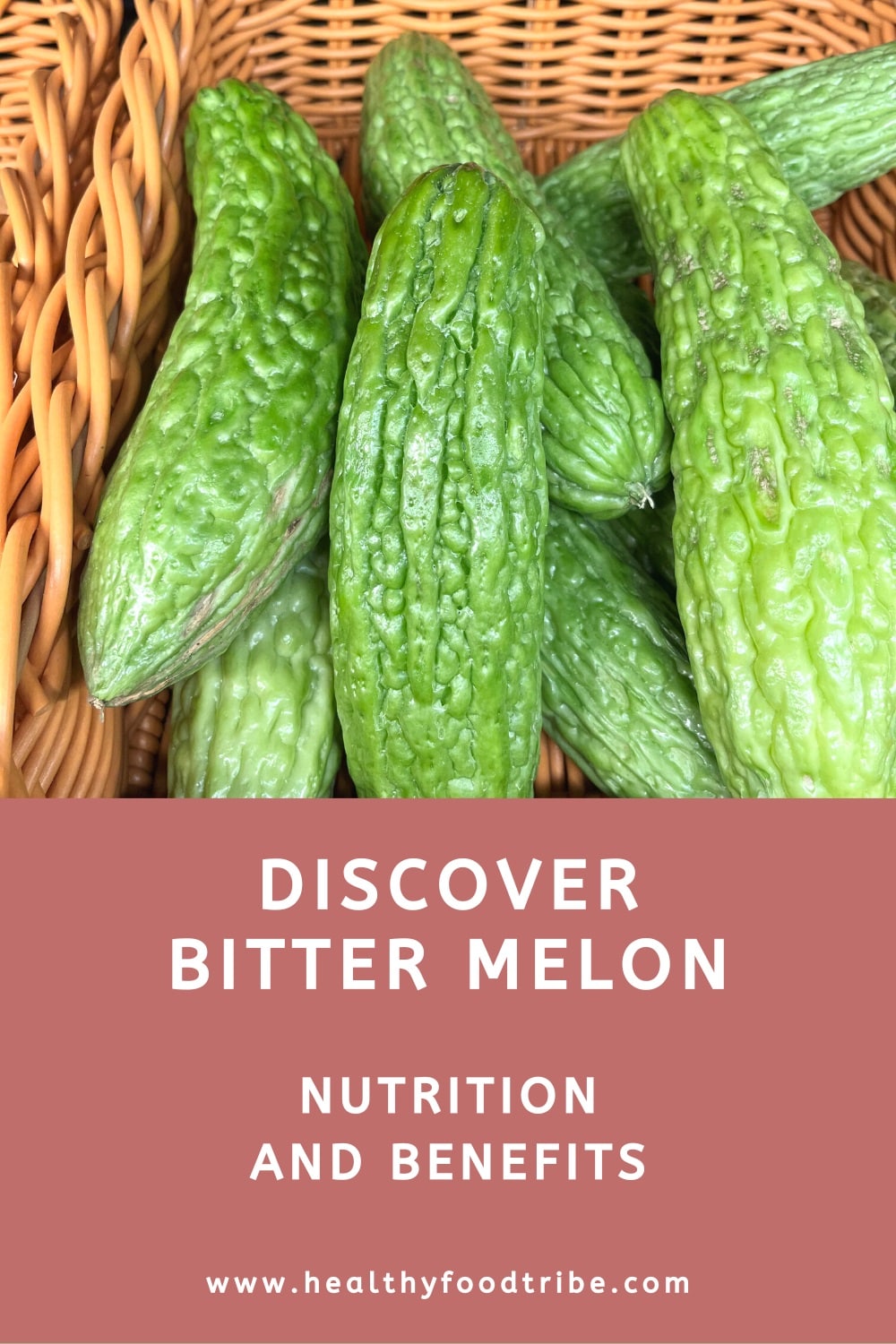
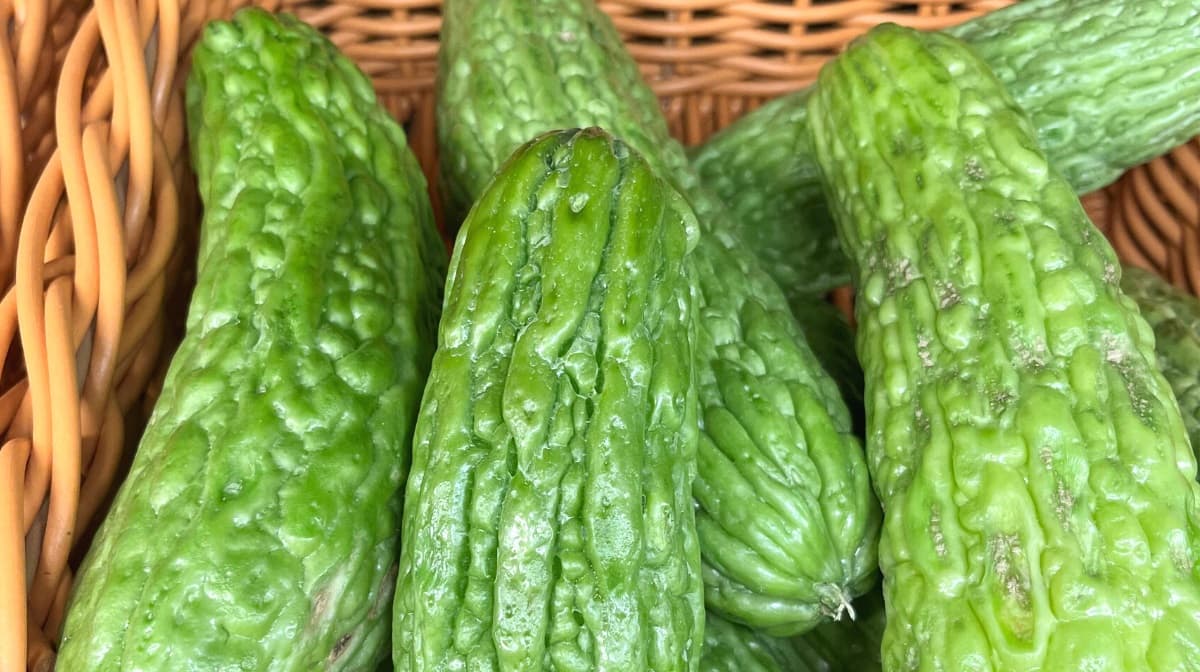

I am going to try bitter melon, hopefully it will help me. Thank you.
Great to hear, Wilma. I would suggest you try a stir fry recipe, it works really well.